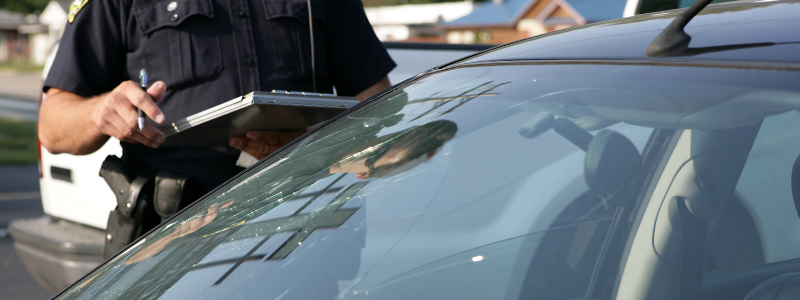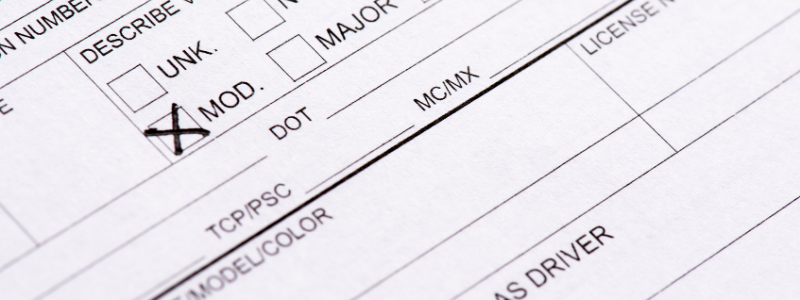Typically, the law requires you to file an accident report if it results in personal injury, death, or property damage. But what about Oregon? Here’s all you need to know.
What is a Police Accident Report?
Also known as an incident report, an accident report is a formal record of the facts related to a vehicle accident.
The report outlines details like:
- What has occurred
- Who was involved
- Where the accident occurred
- Date and time of the incident
An accident report also provides contact information of those involved in the accident including drivers and passengers.
Contact information for anyone who witnessed the accident is also included in the accident report.

Who Creates a Police Accident Report?
The police officers who are called to the scene of the accident fill out an accident report. Sometimes accident experts are also required on the scene to investigate causes and to recreate the accident events.
What is Included in a Police Report
The police report may contain a statement about who was at fault. This statement is based on police professional judgment.
It is a misunderstanding that all accident reports determine fault. The police report often does not assign blame or ticket drivers.
Police reports may include such important details as:
- Accident details including date, time, and location of where the crash occurred
- Driver statements: These may include the fault for the accident.
- Contact details regarding insurance information.
- Eyewitness information and contact data.
- Written details from the officers regarding what they were told about events that led to the accident.
- Police officer conclusions regarding the accident’s cause are based on eyewitness reports and other evidence.
- Injuries observed at the accident scene.
- Description of vehicle damage.
- Weather and road conditions at the time. These may be used to formulate conclusions about how and why the accident occurred
- Diagrams and pictures of the scene. These are used to prove the severity of the accident, property and vehicle damage, and injuries.
- If tickets were issued proving evidence of driver negligence.
When Should You Call Police to the Scene of an Accident?
In some states, even if an accident seems minor, you are legally required to call the police. If they cannot come to the scene, you can report the accident at the nearest police station.
In other states, an official police report is required only if damage to vehicles or property exceeds a specific amount or there are injuries.
Even if an accident seems minor, it is wise to call the police to the scene of an accident. Many times, vehicle or property damage that appears minor can prove costly.
Why are Police Accident Reports Important?
A police incident report is proof that an accident occurred.
The accident report notes the driver or weather causes of the accident. If you sustain an injury, this information may help your lawyer prove your injuries were caused by the accident. In cases of lawsuits, these data are crucial evidence.
If you decide to seek compensation for the damages you suffered, having the details of the accident is vital to your claim.
Is Oregon an At-Fault State?
Yes, Oregon is an at-fault state.
This means that the person who committed a driving error is responsible for injuries and damages.
However, Oregon’s insurance policies must include a built-in provision called personal injury protection (PIP). As writer Mark Fitzpatrick notes, PIP insurance is mandatory in Oregon if you are driving any vehicle except a motorcycle.
A PIP policy has to provide a minimum of $15,000 of coverage per person injured in an accident. This money may be used to cover such accident-related costs as medical bills and lost wages of the driver or passengers involved in the accident.

What is an Oregon Traffic Accident and Insurance Report?
In Oregon, according to the Department of Transportation, you must file an accident report with the Department of Motor Vehicles. This Oregon Traffic Accident and Insurance Report must be filed within the first seventy-two hours after the accident.
Unlike a police report, an Oregon Traffic Accident and Insurance Report, required by the Oregon Department of Transportation, is filed by the drivers involved in the incident. This report must be filed with the Department of Motor Vehicles under certain conditions.
The Law Requires You to File an Accident Report If…
- Damages to vehicles involved in the incident are in excess of $2500. This report must be filed even if only one vehicle was involved.
- A vehicle must be towed from the accident scene, the report must be filed.
- An injury or death occurred as a result of the accident the form must be filed.
- Damages to property at the accident scene exceed $2500, a report must be filed.
So, in most cases, the law requires you to file an accident report if it results in personal injury, death, or property damage (exceeding a certain amount).
What Happens If a Report is Not Filed?
If you fail to file an Oregon Traffic Accident and Insurance Report, the Department of Motor Vehicles will suspend your license.
What About if Damages Were Under $2500?
If damages in an accident do not exceed $2500, you are not required to file an Oregon Traffic Accident and Insurance Report. If the other driver is not insured, you should file a report. Note in this report that it does not meet the $2,500 reporting criteria.
Are Police Reports Admissible in Court?
No. Police reports are considered hearsay. The police did not witness the accident.
However, police reports can provide details from witnesses who saw the accident. These witnesses can testify through deposition or at a trial.

Why Seek Legal Representation After an Accident?
Whether you are injured or you simply have suffered vehicle damage, you are smart to call a lawyer who specializes in personal injury and car accident cases.
If you were injured in a car accident, you need legal representation. Furthermore, you need an attorney who specializes in car accident claims – also known as a car accident attorney.
Lawyers who deal with accident reports and personal injury suits are best equipped to protect your rights and get you the best compensation possible.
With injury attorneys like Ryan Hilts Law, you can trust that your interests are being well represented. You can focus your time and efforts on recovery.
Ryan Hilts Law specialists have a proud history of helping accident injury victims get maximum compensation for pain and suffering, medical bills, and loss of work earnings.
Let’s discuss whether you have a claim for compensation. Request a free consultation from our experienced legal team.





